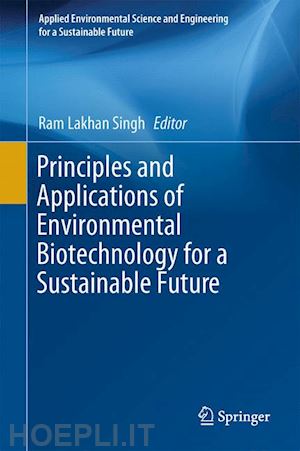
Questo prodotto usufruisce delle SPEDIZIONI GRATIS
selezionando l'opzione Corriere Veloce in fase di ordine.
Pagabile anche con Carta della cultura giovani e del merito, 18App Bonus Cultura e Carta del Docente
This textbook on Environmental Biotechnology not only presents an unbiased overview of the practical biological approaches currently employed to address environmental problems, but also equips readers with a working knowledge of the science that underpins them. Starting with the fundamentals of biotechnology, it subsequently provides detailed discussions of global environmental problems including microbes and their interaction with the environment, xenobiotics and their remediation, solid waste management, waste water treatment, bioreactors, biosensors, biomining and biopesticides.
This book also covers renewable and non-renewable bioenergy resources, biodiversity and its conservation, and approaches to monitoring biotechnological industries, genetically modified microorganism and foods so as to increase awareness.
All chapters are written in a highly accessible style, and each also includes a short bibliography for further research. In summary this textbook offers avaluable asset, allowing students, young researchers and professionals in the biotechnology industry to grasp the basics of environmental biotechnology.
Professor Ram Lakhan Singh is presently holding the positions of Dean, Faculty of Science, Professor & Head, Department of Biochemistry, Head, Department of Environmental sciences and Coordinator, Biotechnology Programme at Dr Ram Manohar Lohia Avadh University, Faizabad. He completed his Master’s degree in Biochemistry from Lucknow University and joined Indian Institute of Toxicology Research, Lucknow, India in 1980. He worked extensively on the toxicity of synthetic dyes and their metabolites and has been awarded Ph.D. degree in 1987. Professor Singh worked in UP Pollution Control Board as Scientific Officer and studied the effects of effluents discharged from various industries on air and water qualities. He moved to G.B. Pant University of Agriculture & Technology, Pantnagar in 1988 as Assistant Professor of Biochemistry and worked on the toxicity of pulp and paper mill effluents on plant and animal systems.
Professor Singh joined Dr. Ram Manohar Lohia Avadh University, Faizabad as Associate Professor of Biochemistry in 1994 and became full Professor in 2002. He developed the undergraduate and postgraduate courses in Biochemistry, Environmental Sciences and Biotechnology. He led and completed various projects funded by DST, UGC, DOE, UPCAR, UPCST etc. and guided 24 Ph.D. students. His main area of research is Environmental Biochemistry and Toxicology. He published more than 85 research papers in peer reviewed journals and participated in various National and International scientific conferences, meetings, symposia and workshops, chaired scientific and technical sessions and presented more than 70 research papers.
Professor Singh has been awarded IUTOX Senior Fellowship by International Union of Toxicology during XI International Congress of Toxicology at Montreal, Canada in 2007. He has been admitted to the Fellowship of the Society of Toxicology, India in 2011 and Fellowship of Academy of Environmental Biology, India in2015.











Il sito utilizza cookie ed altri strumenti di tracciamento che raccolgono informazioni dal dispositivo dell’utente. Oltre ai cookie tecnici ed analitici aggregati, strettamente necessari per il funzionamento di questo sito web, previo consenso dell’utente possono essere installati cookie di profilazione e marketing e cookie dei social media. Cliccando su “Accetto tutti i cookie” saranno attivate tutte le categorie di cookie. Per accettare solo deterninate categorie di cookie, cliccare invece su “Impostazioni cookie”. Chiudendo il banner o continuando a navigare saranno installati solo cookie tecnici. Per maggiori dettagli, consultare la Cookie Policy.